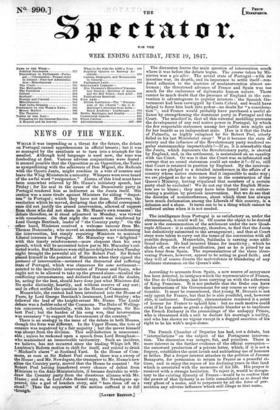NEWS OF THE WEEK.
WHILE it was impending as a threat for the future, the debate on Portugal caused apprehensions in official breasts ; but it was so managed by the assailants as to turn into a triumph for the assailed. Although bold language is used now, the tone was foreboding at first. Various adverse conjunctions were feared : it seemed possible that the Opposition as an Opposition, the Tories as sympathizing with the adherents of Don Miguel, the Radicals with the Oporto Junta, might combine in a vote of censure and leave the Whig Ministers in a minority. Whispers were even heard of the awful word "resignation." Alarms of this kind must have been somewhat relieved by Mr. Hume's initiatory speech, last Friday ; for his zeal in the cause of the Democratic party in Portugal rendered him as indiscreet as the Junta itself. His oration was a mere tirade against Ministers for aiding " despot- ism " in Portugal ; which they have not done. However, the resolution which he moved, declaring that the official correspond- ence did not justify the armed intervention, allowed of support from those who did not share in Mr. Home's own reasons : the debate therefore, as it stood adjourned to Monday, was viewed with uneasiness. On that night the assault was reinforced by Lord George Bentinck, leader of "the Country party." On the other hand, Ministers received a welcome succour from Mr. Thomas Duncombe ; who moved an amendment, not condemning the intervention, but simply requiring Ministers to maintain Liberal interests in Portugal. Mr. Macaulay was " delighted " with this timely reinforcement—more eloquent than his own speech, which will be accounted below par in Mr. Macaulay's col- lected works. But Ministers were still more delighted when Tuesday night brought the powerful aid of Sir Robert Peel. Sir Robert placed himself in the position of Ministers when they signed the protocol of intervention—reviewed the distracted and suffering state of Portugal, which was clamorous for some settlement— pointed to the inevitable intervention of France and Spain, who ought not to be allowed to take up the ground alone—recalled the conflicting circumstances, and declared that amid all the doubts, he, acting for the best, should have done just what Ministers did. He spoke distinctly, heartily, and without reserve of any sort; and in effect settled the question in the House of Commons.
Meanwhile the contest had been introduced into the House of Peers, by Lord George Bentinck's lieutenant, Lord Stanley ; who followed the lead of the knight-errant Mr. Hume. The Lords' debate was a feebler echo of the Commons. The Duke of Welling- ton concurred, substantially, with his late colleague, Sir Ro- bert Peel ; but the burden of his song was, that intervention was necessary "to support the Government of the country."
There is an analogy- in the issue of the debate in both Houses, though the form was different. In the Upper House, the vote of censure was negatived bya fair majority ; but the mover himself was absent from the division. This self-defection is unaccount- able ; unless he reckoned upon a speech from Lord Brougham— who maintained an immoveable taciturnity. Such an incident, we believe' has not occurred since the leading Whigs left Mr. Lambton's Reform motion to shift for itself, and retired to drink "Michael's claret" at Scotland Yard. In the House of Com- mons as soon as Sir Robert Peel ceased, there was a sweep of the House; and Mr. Newdegate, the trumpeter to Mr. Hume's new allies the Country party, moved that the House be counted ! Sir Robert Peel having transferred every chance of defeat from Ministers to the Anti-Ministerialists, it became desirable to with- draw the Country party from the disastrous alliance with Mr. Hume; and so, as Lord John Russell says, Mr. Newdegate ap- peared, like a god of heathen story, and " bore them off on a cloud." Thus the supporters of the motion suffered it to fall through.


























